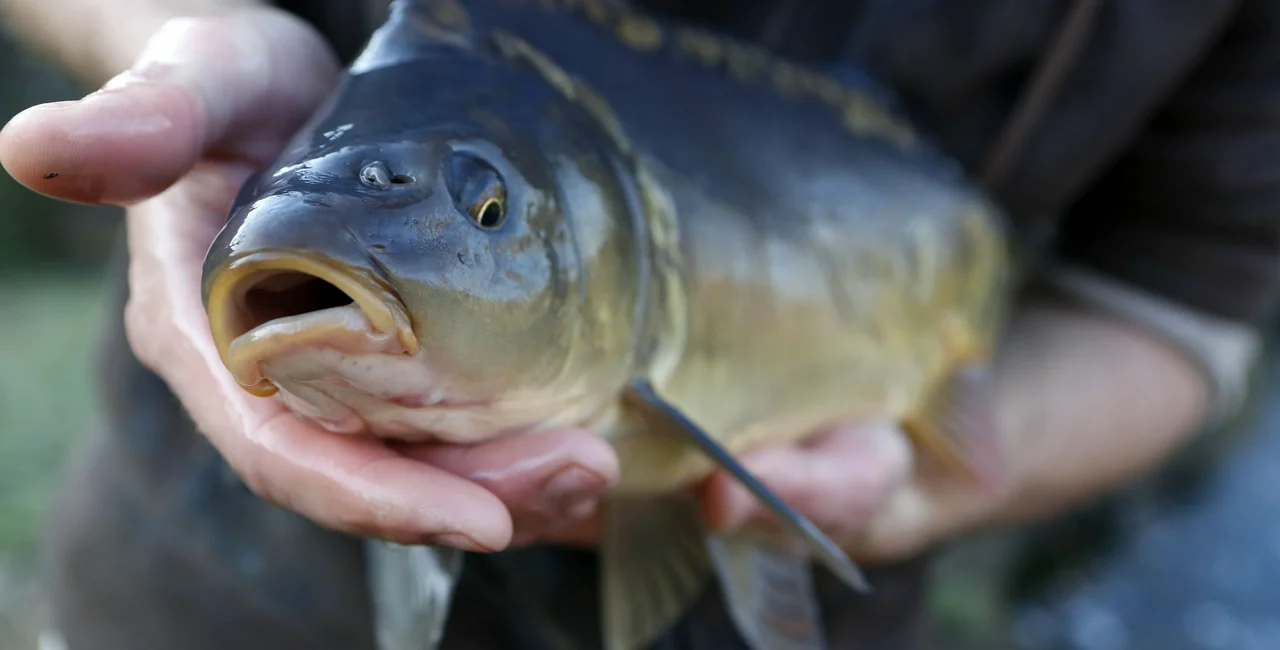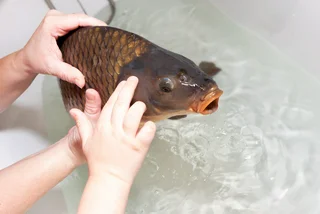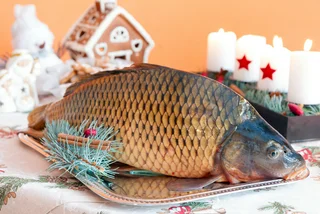This year it seems a number of groups have a bone to pick with the traditional Czech holiday meal of carp. Animal rights activists have long protested the tradition calling the long-standing practice of storing the fish in the bathtub cruel, while an unexpected source has called out carp harvesting as bad for the environment.
Stalls where live carp are fished out of vats and prepared into fillets on the spot turn up every year a few days before Dec. 24. Fresh carp is now on sale at some 3,000 stands across the Czech Republic, with about 210 of them in Prague and 300 more in Central Bohemia. About one-third of the stands are in the South Moravia region.
This year you might be more likely to spot Christmas carp swimming through your social media feed. In a video promoted by French-owned Komerční banka across social networks people are urged not to eat carp for environmental reasons.
In an Instagram video labeled as a paid partnership with Komerční banka, influencer Lucie Zelenková, who has over 91,000 followers, urges people to not eat carp this Christmas due to the carbon footprint the fish make. The video claims that the 18,000 tons of fish eaten by Czechs on Christmas generate 32,000 tons of carbon dioxide. “And that's a huge number Don't you want to try it differently this year?” Zelenková said.
“I know that the carp tradition is popular in the Czech Republic and many people cannot imagine the holidays without it. But still, even if only some of us tried some other option, maybe only once, for a test, in one day, one evening, the carbon footprint would be reduced by a good deal,” she writes in the post, saying the bank asked her to take a look at the topic of the carbon footprint of carp.
While Zelenková doesn't suggest any sustainably sourced options some experts say farmed fish, actually has a lower carbon footprint than red meat such as beef, pork, or lamb, but can have slightly more than poultry.
Deputy Speaker of the Chamber of Deputies Jan Bartošek is ready to make the video an international incident.
“As a member of the South Bohemia region and a fisherman, I was touched by the fact that KB, a foreign-owned company, is campaigning to rethink the Christmas menu with traditional carp! Some things should not be fashionable. Komerční banka, what would happen in France if someone wanted to take their fishermen's jobs?” he tweeted.
Jako poslance JÄŒ kraje a rybáře se mÄ› dotklo, že zahraniÄnÃm kapitálem vlastnÄ›ná KB dÄ›lá kampaň o pÅ™ehodnocenà štÄ›droveÄernÃho menu s tradiÄnÃm kaprem! NÄ›které vÄ›ci by nemÄ›ly podléhat módÄ›. @komercka co by se asi ve Francii dÄ›lo, kdyby jejich rybářům chtÄ›l nÄ›kdo brát práci? pic.twitter.com/rEM6Snpqj7
— Jan BartoÅ¡ek (@honzabartosek) December 20, 2021
Member of European Parliament Tomáš Zdechovský said on Twitter that he has already complained to France about the video. “In fact, whenever someone in air-conditioned high-rise offices talks about farmers or fishermen as CO2 producers, I think about their stupidity,” he said.
PopravdÄ› vždy, když nÄ›kdo z klimatizovaných kancelářà výškových budov hovořà o zemÄ›dÄ›lcÃch nebo rybářÃch jako producentech CO2, pÅ™emýšlÃm nad jeho hloupostÃ.
— Tomáš Zdechovský (@TomasZdechovsky) December 21, 2021
#kapr a vánoce nemohou za VaÅ¡Ã uhlÃkovou stopu 😎
Komerční banka has been owned by French banking group Société Générale since 2001.
The Czech State Veterinary Administration (SVS), which has yet to address the issue of carps’ carbon footprint, is currently inspecting carp street vendors to check both the handling of live fish and compliance with laws meant to protect animals from cruelty. They say conditions for street sales of carp have improved.
“I believe that this is due to both education and consistent veterinary supervision, which focuses primarily on problem retailers from previous years,” SVS director Zbyněk Semerád said.
Before last Christmas, veterinary inspectors checked over 830 points of sale. About 2 percent of inspections turned up a problem, while in 2019, it was 4 percent.
Hygiene problems were found in 11 cases, and animal welfare problems in five cases. Welfare rules determine whether the fish have enough oxygen and that the vats are not overfilled among other regulations.
The SVS has increasingly been concerned with the misuse of protected designations that can mislead consumers about the origin of the fish. Carp from Třeboň have a protected designation of origin from the EU, and carp raised elsewhere can’t be sold as Třeboň carp.
Animal rights group Compassion in World Farming opposes the sale of live fish and warns against keeping them in a bathtub at home before killing and cooking them, which some families still do though the practice is less common these days. The bathtub is an unsuitable environment because the chlorine contained in the water can damage the animal's skin and nervous system.
A relatively new tradition is buying a live carp from a vendor so it can be set free by releasing it in a river. Some environmental groups do this for a photo opportunity. Families sometimes do it at the urging of children, who don’t want the carp to be killed.
Wildlife experts, however, warn against doing this, as the carp usually dies soon after being released. Carp in the wild live off their stored fat during the winter, but those intended for the market have already been slimmed down. A freed carp will not have enough fat to last until the spring. The temperature of the river will also injure carp because they will not be able to adapt.
Whether any of this will affect the carp tradition at the Czech Christmas table remains to be seen. But the popularity of the dish is apparently on the wane. In a recent survey, chicken schnitzel (kuřecí řízek) was found to be the preferred holiday entree on Dec. 24.












 Reading time: 4 minutes
Reading time: 4 minutes 
































